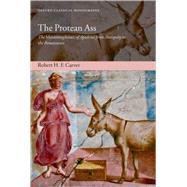The Protean Ass The Metamorphoses of Apuleius from Antiquity to the Renaissance
, by Carver, Robert H.F.- ISBN: 9780199217861 | 0199217866
- Cover: Hardcover
- Copyright: 2/3/2008
Apuleius' account in The Golden Ass (or Metamorphoses) of the curious young man who is changed into a donkey following an affair with a witch's slave-girl continues to delight and perplex readers even after the passage of eighteen centuries. Lucius' asinine adventures include abduction by bandits, service to a troupe of debauched priests, congress with a Corinthian lady (the seed of Bottom's erotic entanglement with Titania in A Midsummer Night's Dream), and the overhearing of a large number of stories (most famously, 'Cupid and Psyche'), before a divine vision transforms him into a disciple of the goddess Isis. The Protean Ass provides the most comprehensive account (in any language) of the reception of this complex work, tracing readers' responses from the third to the seventeenth centuries. In the opening chapter, pagan and patristic reactions are analysed (Augustine, Martianus Capella, and Fulgentius), and The Golden Ass is tracked until its disappearance in the sixth century. Chapter 2 reappraises the manuscript tradition, exploring the role of Monte Cassino (where the oldest surviving copy of the work was copied in the eleventh century) and combining recent codicological critiques with medieval testimonia to re-examine the persistent claims that The Golden Ass was known in twelfth- and thirteenth-century France and England. Chapter 3 is devoted to the early Humanists (most significantly, Petrarch and Boccaccio) and the so-called 'Pre-Humanists' (Benzo d'Alessandria and Thomas de Waleys). The middle chapters establish cultural and ideological contexts for the printing of the editio princeps (Rome, 1469) and Beroaldo's Commentary (Bologna, 1500) and use The Golden Ass to stabilize one of the most mercurial of Renaissance texts, the Hypnerotomachia Poliphili (Venice, 1499), locating it within a complex network of literary sodalities linking Rome, Venice, Vienna, and Germany. An extensive investigation into the Northern reception of Apuleius (Conrad Celtis, Erasmus, More, Vives), and a detailed analysis of William Adlington's English translation (1566) lead into a survey of English Renaissance receptions and a series of case-studies of Sidney, Spenser, and Shakespeare. Book jacket.







